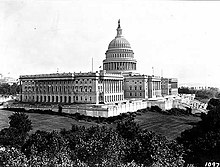Fifty-first Congress
| 51st United States Congress | |
|---|---|
|
50th ←
→ 52nd
|
|

United States Capitol (1906)
|
|
| March 4, 1889 – March 4, 1891 | |
| Senate President | Levi P. Morton (R) |
| Senate Pres. pro tem | John J. Ingalls (R) |
| House Speaker | Thomas B. Reed (R) |
| Members | 88 Senators 332 Representatives 9 Non-voting members |
| Senate Majority | Republican |
| House Majority | Republican |
| Sessions | |
|
Special: March 4, 1889 – April 2, 1889 1st: December 2, 1889 – October 1, 1890 2nd: December 1, 1890 – March 3, 1891 |
|
The Fifty-first United States Congress, referred to by some critics as the Billion Dollar Congress, was a meeting of the legislative branch of the United States federal government, consisting of the United States Senate and the United States House of Representatives. It met in Washington, D.C., from March 4, 1889, to March 4, 1891, during the first two years of the administration of U.S. President Benjamin Harrison.
The apportionment of seats in this House of Representatives was based on the Tenth Census of the United States in 1880. Both chambers had a Republican majority. This marked the first time since the 43rd United States Congress that both chambers were controlled by the president's party.
It was responsible for a number of pieces of landmark legislation, many of which asserted the authority of the federal government.
Emboldened by their success in the elections of 1888, the Republicans enacted virtually their entire platform during their first 303-day session, including a measure that provided American Civil War veterans with generous pensions and expanded the list of eligible recipients to include noncombatants and the children of veterans. Grover Cleveland had vetoed a similar bill in 1887. It was criticized as the "Billion Dollar Congress'" for its lavish spending and, for this reason it incited drastic reversals in public support that led to Cleveland's reelection in 1892.
Other important legislation passed into law by the Congress included the McKinley tariff, authored by Representative, and future President, William McKinley; the Sherman Antitrust Act, which prohibited business combinations that restricted trade; and the Sherman Silver Purchase Act, which required the U.S. government to mint silver. The last two were concessions to Western farmer interests in exchange for support of the tariff and would become central tenets of the Populist Party later in the decade. They were authored by Senator John Sherman.
...
Wikipedia
